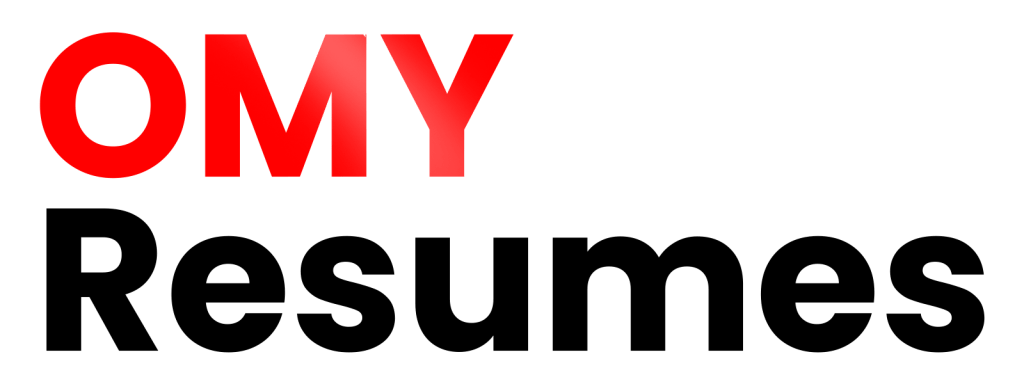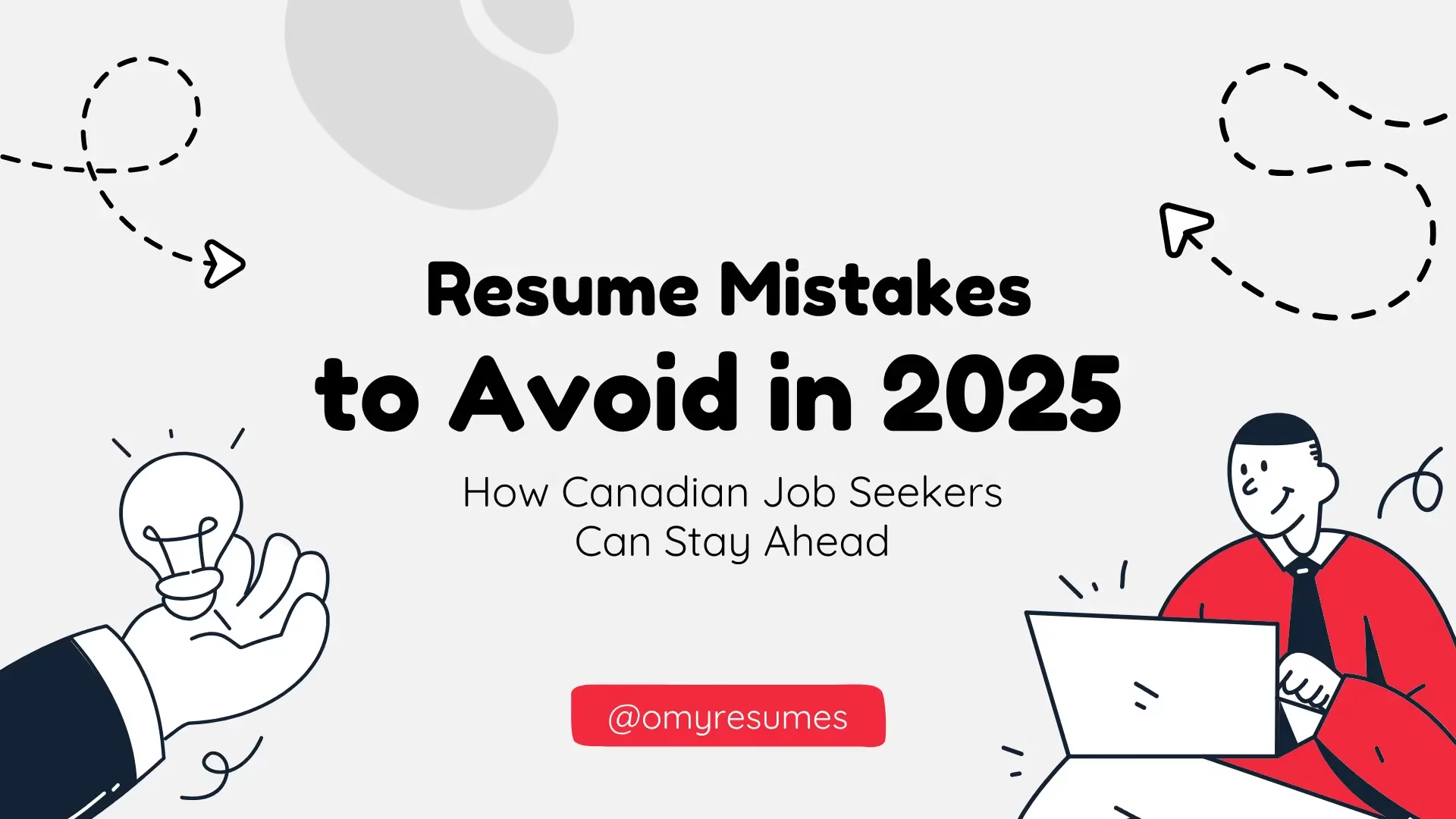Introduction
The Canadian job market in 2025 is more competitive than ever. Employers in Toronto, Vancouver, Calgary, Ottawa, and Montreal are flooded with applications, and your resume has less than 10 seconds to make an impression. Yet, many talented professionals continue to lose opportunities—not because they lack skills, but because their resumes are filled with avoidable mistakes.
From improper formatting and spelling errors to outdated design choices and ineffective length, resume mistakes can silently sabotage your job search. With applicant tracking systems (ATS) filtering applications before a hiring manager even sees them, a single misstep can cost you an interview.
At OMY Resumes, we’ve helped thousands of Canadians craft ATS-friendly resumes, industry-specific applications, and professional profiles that land interviews faster. In this guide, we’ll break down the most common resume mistakes in 2025, explain how they impact your job search, and share practical, actionable strategies to fix them.
Why Resume Mistakes Are Costlier in 2025
Hiring trends in Canada are evolving quickly. According to Job Bank Canada, the unemployment rate remains low across many industries, yet competition for top roles in IT, healthcare, finance, and engineering is fierce. Employers increasingly rely on technology—especially AI-powered ATS—to filter resumes.
That means:
- Spelling errors can reduce keyword matches.
- Overly designed resumes may not parse correctly in ATS.
- Generic applications get overlooked when hiring managers seek tailored, industry-specific resumes.
In short, mistakes that might have been forgiven in 2010 are career killers in 2025.
1. Writing a Resume That’s Too Long (or Too Short)
One of the biggest pitfalls Canadian job seekers face is resume length.
- Too long: Submitting a 4–5 page resume overwhelms recruiters. Unless you’re an executive with decades of experience, keep it concise.
- Too short: A one-page resume may undersell your expertise if you have more than three years of professional experience.
The 2025 sweet spot:
- Entry-level roles: 1 page
- Mid-level professionals: 2 pages
- Executives or academics: 2–3 pages (with a strategic focus on accomplishments)
👉 If you’re struggling with length, our Resume Writing Services help balance detail with impact.
2. Poor Formatting That Confuses ATS Systems
ATS-friendly resumes are non-negotiable in 2025. Using graphics, tables, or text boxes can break formatting when parsed by automated systems.
Mistakes to avoid:
- Using fancy fonts or images.
- Saving resumes only as PDFs without checking ATS compatibility.
- Ignoring consistent headings for Experience, Education, and Skills.
Pro Tip: Stick with clean formatting, use standard headings, and save your resume in both Word (.docx) and PDF.
If you’re applying in competitive regions like Toronto or Vancouver, consider OMY’s Toronto Resume Services for customized, ATS-proof formats.
3. Spelling, Grammar, and Typo Errors
It may seem obvious, but spelling mistakes remain one of the top resume deal-breakers in Canada. A typo like “manger” instead of “manager” signals carelessness.
Why it matters:
- ATS may not recognize misspelled keywords.
- Hiring managers see it as a lack of attention to detail.
Quick fix:
- Use tools like Grammarly, but always double-check manually.
- Ask a friend or request to review your resume for free.
4. Using Outdated Resume Trends
In 2025, certain practices are considered red flags:
- Including a full home address (privacy risks).
- Adding “References available upon request.”
- Using outdated objective statements instead of modern summaries.
Better approach:
Replace the objective with a professional summary tailored to the role. Example:
✅ “Results-driven IT specialist with 7+ years’ experience in cloud systems and cybersecurity, helping Toronto-based enterprises improve data security and system performance.”
5. Ignoring Keywords and ATS Optimization
Canadian employers use ATS to filter resumes before they reach human eyes. If your resume doesn’t include the right keywords from the job posting, it may never get read.
Example:
A healthcare resume without “patient care,” “clinical documentation,” or “HIPAA compliance” won’t pass filters.
👉 Explore our Healthcare Resume Writing page for industry-specific keyword strategies.
6. Generic Resumes Sent Everywhere
One-size-fits-all resumes rarely succeed. Employers in Toronto expect customized applications that reflect the company’s needs.
Case Study:
A finance graduate applied to 25 jobs with the same resume and heard nothing back. After tailoring his resume with role-specific keywords and metrics, he landed two interviews in a week.
7. Failing to Quantify Achievements
Canadian recruiters want measurable results, not just duties.
Weak:
“Responsible for managing a team.”
Strong:
“Led a team of 8 sales reps, increasing Toronto region revenue by 32% in 12 months.”
Numbers and results create impact.
8. Ignoring LinkedIn and Online Presence
In 2025, resumes and LinkedIn profiles must complement each other. Employers cross-check applications with online profiles.
Mistake: Having a polished resume but an outdated or empty LinkedIn profile.
👉 Our LinkedIn Profile Optimization service ensures consistency across all platforms.
9. Forgetting the Cover Letter
Many Canadian job seekers think cover letters are outdated—but in 2025, they’re more relevant than ever. They allow you to personalize your application and highlight what your resume can’t.
Mistake: Submitting resumes without tailored cover letters.
👉 Pair your resume with our Cover Letter Writing service to maximize impact.
10. Overlooking Industry-Specific Needs
Different industries demand different resume styles:
- IT & Engineering: Emphasize technical skills and certifications.
- Healthcare: Highlight compliance, patient outcomes, and teamwork.
- Finance: Showcase numbers, audits, and regulatory experience.
👉 See our IT Resume Writing and other industry-specific services for tailored guidance.
11. Lack of Digital Portfolios for Creative Fields
In 2025, creatives in marketing, design, and media need more than a resume. Employers expect a portfolio.
Mistake: Applying to creative roles without a portfolio link.
👉 OMY offers Portfolio Website Development to showcase your work professionally.
12. Weak Interview Preparation After Resume Success
A flawless resume opens doors—but interviews seal the deal.
Mistake: Focusing only on resumes while ignoring interview skills.
👉 Boost confidence with our Interview Preparation Coaching.
13. Neglecting Regional Hiring Trends
Toronto, Calgary, and Vancouver have unique hiring climates. A generic resume that doesn’t account for regional demand may fail.
Example:
- Toronto → finance & IT demand.
- Calgary → engineering & energy.
- Vancouver → healthcare & creative industries.
Understanding local job market data helps tailor resumes effectively.
Conclusion
In 2025, resume mistakes aren’t just minor slip-ups—they’re deal-breakers. Whether it’s poor formatting, spelling errors, ignoring ATS optimization, or skipping LinkedIn integration, each misstep lowers your chances in a highly competitive Canadian job market.
The good news? Every mistake has a solution. From resume writing services and cover letter writing to LinkedIn optimization and career consultation, OMY Resumes ensures your application package is polished, professional, and tailored for success.
Ready to stand out in Toronto, Vancouver, Calgary, or beyond?
Our expert team creates ATS-friendly resumes and career documents that land interviews faster. Don’t let common mistakes hold you back—book your free consultation today and take the first step toward your dream career in Canada.

